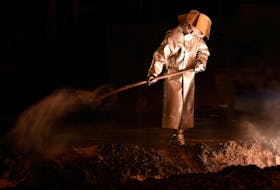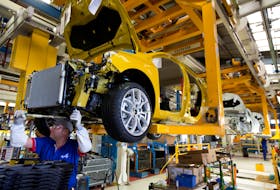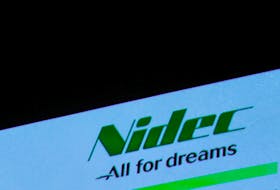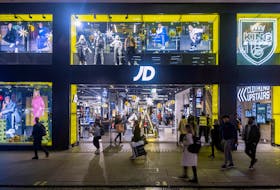Alastair Leslie Collis is the third generation of Collises to sell and tune pianos in Newfoundland. Collis — who says his family hasn’t voted since Newfoundland joined Confederation in 1949, before which he says his father had long telephone conversations with Joey Smallwood — has played piano with Tony Bennett and Celine Dion. He splits his time between Newfoundland and California, where the Collis family has had a residence since the ’60s, prompted partly by meeting Bob Hope when the legendary entertainer was stormbound in Botwood in 1943, and Alastair’s father was asked to tune the Steinway for Hope’s performance. Alastair still plays the piano at least a couple of hours a day in the house near the A.L. Collis shop (556 Topsail Rd.,
St. John’s), which was a branch of the family business that was opened in 1962 and is the last remaining outlet for the business, which has been in operation for more than a century.
I know when A.L. Collis opened —
it says right on the sign: 1910. Who opened it?
My grandfather, Athelstan Lockyer Collis.
Tell me what A.L. Collis the business does.
We rebuild, and we made pianos, right up until three years ago. We were producing pianos in Harbour Grace, that’s where the factory was. When my grandfather came back — he (studied) singing up in Montreal — what happened was my grandfather started to go blind. In those days it was called tunnel vision. Today they could fix it. He ended up coming back, and Trinity was dying out at the time, so he moved to Harbour Grace, because Harbour Grace had water and sewer 50 years before St. John’s, and he said this is probably the place to settle. And so we were there until 2001. Then we moved the factory in here, where we still rebuild pianos.
The work is really artisan work that nobody else really does. There are a lot of factories around the country — Steinway’s got one — but basically, when the Asians took us over, with the Japanese and Yahama, it went from there. I went to Korea and worked in Korea for six months with Young Chang. Tremendous. The technology, with robots and so on — now, if you want a handmade piano, it’s a different story.
When did your father take over
from your grandfather?
When my grandfather was going blind — fantastic singer. If you go down to VOWR you might get the tape of where he used to sing, in different places. He was a baritone, like Pavarotti. Dad used to lead him around the island tuning pianos. They’d go out to Howley, or go out to Corner Brook, or out to Labrador, whatever had to be done. My father always told me, “Collis…” — he always called me “Collis” — “… no matter what it is, if it’s one piano in Fogo or Burgeo, whatever it is, you’ve gotta go and do it.” And that was the key to the business, really. Service. (James Leslie Collis inherited the business in the ’40s.)
When did you take over the business?
I took over the business in 1982. I worked in it from 1976, but I took it over after my father died in ’82. I was in Japan at the time. Dad phoned me, he said, “I’m not very well.” The people in the shop had the flu, and I thought, “That’s only a bit of pleurisy, or something. You’ll be all right.”
The next day he phoned me, he said, “You’d better come home out of it.” I was home one day, and he said, “Alastair, look after the business, and look after your mother.”
She’s 91, going on 92 in January, and she’s still picking berries, still drives her own
car.
You mentioned that up until a few years ago,
A.L. Collis was still making pianos.
Why is it not making pianos anymore?
Because the market is too expensive for me to make a piano, for us to produce the piano. With the Far East stuff — you’re going to see the same thing in the car business, you’re going to see the same thing in everything, because there’s no way we can compete with the cheap labour. And I feel it’s unfair for people to do the work for less money than what is needed. They have families to rear and obligations, so that’s very important.
But the company’s still keeping on
with the tuning and sales.
Yes, that’s our main business. I love going out and tuning pianos — I tune pianos my grandfather tuned a hundred years ago. I’m still doing them. As long as they maintain the pianos, I’m very happy. I’ve got a lady coming in tomorrow from Ferryland, and she had a piano that they got here back in the ’60s or ’70s, and she’ll be here and she’ll buy a new piano and trade it in, or I’ll build her piano up and repair it. Whatever’s got to be done.
How good of an ear do you have to have to tune pianos, or is that something that can be taught?
We’ve trained 11 tuners over the years. Some are dead now, some are retired.
What’s the market like for musical instruments? Are you selling as many as you once did?
We used to sell one a day, every day, whether it was here or — we had seven stores across the island. I don’t know if you want to report what I’m going to say…
Well, I’m asking. I’m asking a question about what sales are like.
We used to sell a piano every day. With the middle class cut out of it, now we have people coming in looking for used pianos, and there’s ample, enough pianos, and they’re better than new ones for the price range, because the new ones are made out of pressboard and stuff we can’t refinish. Just junk, you throw it away. I maintain the old pianos, and there’s new ones. And if someone comes in with 50 grand, I can sell them a real piano. That’s basically where it is. What we built our business on was the middle class, and people had a piano for $3,000 or $4,000, and they had it for their families and they all did well, and it was a fantastic, wonderful thing that we did at that time.
But now it’s sort of divided, and I don’t like that. I’d rather that people have the means to avail themselves of music. That’s my main concern at this time.
Is there another A.L. waiting in the wings to take over from you?
Yes there is. My daughter. Anna Leslie. She’ll take over the business.
Fourth generation. Do you think your grandfather ever envisioned that it would go on that long?
I don’t think so. At that time it was a very slim possibility that he could even make it work. My father ended up in his house on LeMarchant Street in Harbour Grace, just about burned to death. Forty-five skin grafts put on his legs, but you’d never know. They did such a marvelous job at the hospital here in St. John’s. Fortunately, he met my mother there. She was working as a nurse. Fell in love with her. So in the Model-A Ford his father bought for $125 that he rebuilt and re-riveted, completely, he went up to Coley’s Point, and here was Mother riding on a bike. She was off for the summer, the schooling was over at the General (Hospital) where she was nursing. He asked her to get married, and they got married. And they were 17 years after they got married before they had me.
And I can’t regret anything, really. ... We’ve done our work, because I promised to do it.








